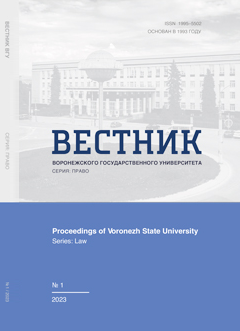Общие положения перевода права в машиночитаемый вид и технологии больших данных (Big Data)
Аннотация
Исследуются общие вопросы машиночитаемого права, а также роль больших данных при создании машиночитаемого и машиноисполняемого права; анализируются доктринальные подходы к сущности и переводу права в машиночитаемый вид, определению критериев качества машиночитаемого права, выявляются и анализируются принципы машиночитаемого права и возможности, связанные с внедрением Big Data при переводе права в машиночитаемый вид.
Скачивания
Литература
Vashkevich A. M. Automation of law : law is like electricity. Moscow : Simpler, 2019.
Issues of regulation of the digital economy : analytical report / O. S. Shepeleva, M. A. Suchkova, A. V. Bogapova [et al.] ; Center for strategic research foundation. M., 2019.
Zenin S. S., Kuteinikov D. L., Yapryntsev I. M. Big data in the legislative process // Actual problems of russian law. 2020. No. 9.
Kovaleva N. N. Machine-readable law as a mechanism for smart regulation in the fi eld of communications // Legal policy and legal life. 2019. No. 3.
Training of neural networks on data arrays of legislation and law enforcement practice : the potential for the introduction of machine-readable law. URL
Ponkin I. V. The concept of machine-readable and machine-executable law : relevance, purpose, place in RegTech, content, ontology and prospects // International journal of open information technologies. 2020. Vol. 8, no. 9.
Law-making in the conditions of law algorithmization / S. S. Zenin, D. L. Kuteinikov, O. A. Izhaev, I. M. Yapryntsev // Lex russica. 2020. Vol. 73, no. 7.
Rodionova O. M. Law and digital technologies // Bulletin of the Saratov state law academy. 2019. No. 6.
Filipova I. A. Algorithmization : impact on the sphere of labor and its regulation // Russian justice. 2020. No. 11.
Baldwin R., Cave M., Lodge M. Understanding regulation : theory, strategy and practice. 2nd ed. Oxford : OUP, 2012. URL
Butler T. Standard-based semantic technologies for smart regulation. 2017 // White paper, governance, risk & compliance technology centre, university of Cork. URL
Cappelletti M. Alternative dispute resolution processes within the framework of the world-wide access-to-justice-movement // The Modern law review limited. 1993. No. 56. URL
Colaert V. RegTech as a response to regulatory expansion in the financial sector // Oxoford business law blog. 2015. URL
Ferran E. Institutional design : the choices for national systems // The Oxford handbook of financial regulation / N. Moloney, E. Ferran, J. Payne (eds.). Oxford : OUP, 2015.
Micheler E., Whaley A. Regulatory technology : replacing law with computer code // Eur bus org law rev. 2020. No. 21. URL
Pasquale F. A rule of persons, not machines : the limits of legal automation // George wash law rev. 2019. No. 87 (1).
Ranchordás. S Cities as corporations? The privatisation of cities and the automation of local law // Autonomous systems and the law / N. Aggarwal, H. Eidenmüller, L. Enriques, J. Payne, van Zwieten K. (eds.). Munich : C. H. Beck & Nomos, 2019.
Data science and political economy : application to fi nancial regulatory structure / O'Sharyn, S.Halloran, S. Sameer Maskey, Geraldine G. McAllister, D. K. Park, [et al.] // The Russell sage foundation journal of the social sciences. 2016. No. 2 (7).
Yeung K. Regulation by blockchain : the emerging battle for supremacy between the code of law and code as law // The modern law rev. 2019. No. 82 (2).










